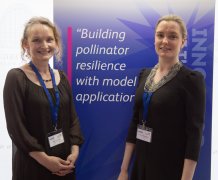Articles

Dr Grace Twiston-Davies and Professor Juliet Osborne
‘BEEHAVE’ project wins innovation award
A project which helps protect bees has won the 2017 BBSRC Innovator of the Year award for Social Impact.
The computer model BEEHAVE, developed at the University of Exeter and Rothamsted Research, simulates how a honeybee colony will develop and survive in different surroundings.
This model, together with a new one simulating bumblebee population growth, are being used by farmers, scientists and regulators to decide how to manage land and how to intervene to help bees.
The BBSRC said the project was “global in its thinking”.
Professor Juliet Osborne, Director of the Environment and Sustainability Institute on the university’s Penryn Campus in Cornwall, leads the BEEHAVE team, which includes Dr Matthias Becher (Research Fellow, model developer), Dr Grace Twiston-Davies (NERC Impact Fellow) and collaborator Professor Volker Grimm of UFZ Leipzig, Germany.
Professor Osborne said: “We were delighted to hear that we had won the social impact category. In particular, whilst it was my name that was called, it is a team win.
“I am really proud of my colleagues who have worked with me to create impact from our research.”
The BEEHAVE computer models can be used to simulate the effects on bee colonies of multiple “stressors” – factors such as disease, pesticides, land-use change and beekeeping interventions.
Forage availability – nectar and pollen resources – can be translated from real to virtual landscapes via a user-friendly mobile app called BeeMapp.
BEEHAVE has attracted substantial interest from regulators and agrochemical companies.
The European Food Safety Authority has evaluated BEEHAVE and is now using it as the framework to design further models for bee health risk assessments.
Professor Osborne said: “It is really important that the research we do, funded by Research Councils, is applicable and useful to a wide range of users.
“Ensuring the research has impact can be challenging but is very rewarding, and it is great to be recognised for this.”
With pollinator populations in decline, posing a considerable threat to global food production, BEEHAVE aims to build pollinator resilience through informed land management and beekeeping practices.
The BBSRC Innovator of the Year competition recognises the important impact bioscience research and innovation has on lives, society and the economy.
Date: 20 June 2017
